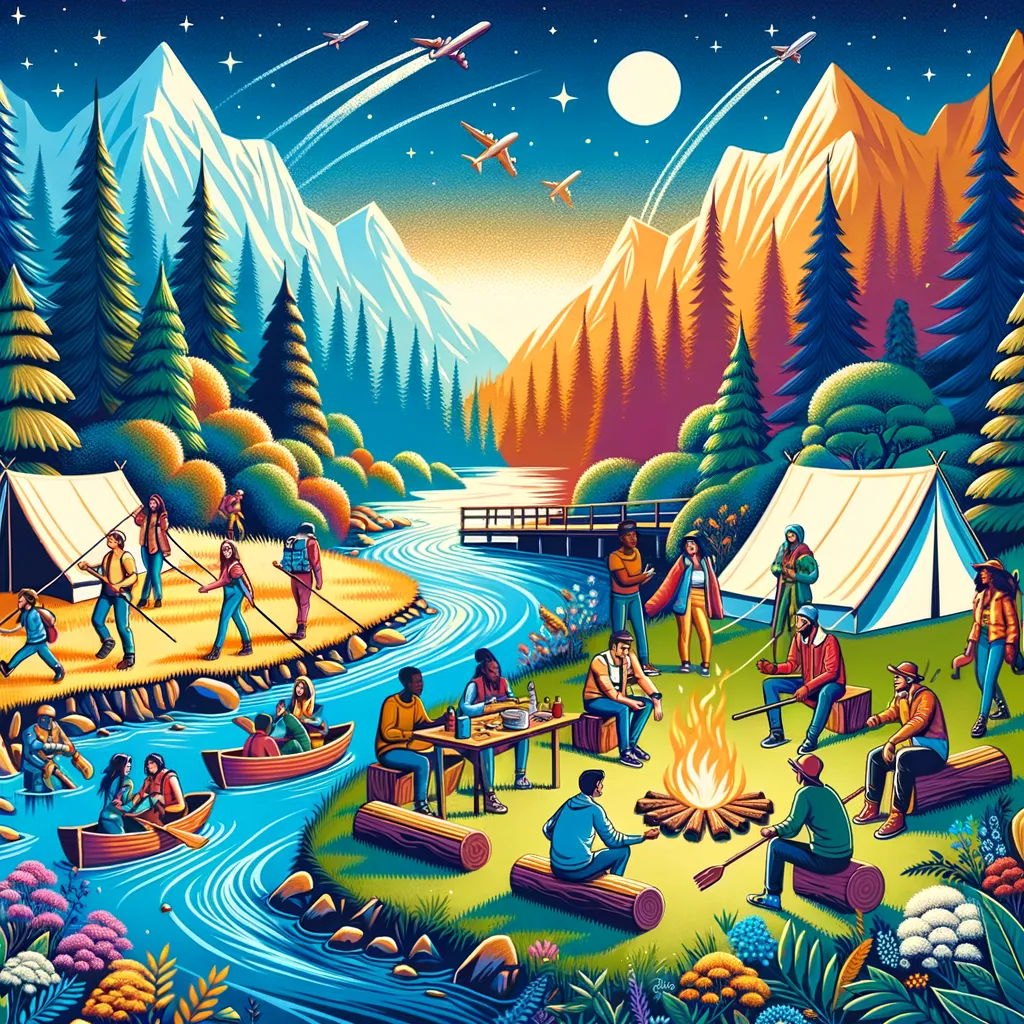Embracing the World Outside: Cultural Exchange Through Outdoor Activities
Welcome to a vibrant journey where the beauty of nature meets the richness of diverse cultures! As parents, fostering an environment where our children can learn, appreciate, and engage with various cultures through outdoor activities not just broadens their horizons but also plants the seeds of global understanding and respect from a young age. In this guide, we’ll explore inspiring ways to weave cultural exchange into our outdoor adventures, creating unforgettable memories and invaluable lessons along the way.
Whether it’s a local Camping trip that introduces your family to the traditions of the land’s native people or a day of Outdoor Activities that includes games from around the globe, the possibilities are as limitless as the great outdoors itself. Join us as we step outside our doorsteps and into a world of cultural discovery!
Why Cultural Exchange Matters in the Great Outdoors
Immersing ourselves and our children in cultural exchange opportunities while engaging in outdoor activities is more than just fun—it’s a holistic learning experience. It teaches empathy, promotes inclusiveness, and encourages curiosity about the world. When children learn about different cultures in a context that is engaging, like during a camping trip or while playing international games, the lessons stick with them far longer than something read from a book.
Engaging in outdoor activities that have a cultural component also provides a unique platform for experiential learning. By participating in culturally significant practices, children can gain a deeper appreciation for the diversity of the world’s people and environments. This helps to cultivate a sense of global citizenship and responsibility towards preserving cultural heritages and natural landscapes.
Planning Your Cultural Exchange Adventure
Embarking on a cultural exchange journey through outdoor activities requires thoughtful planning to ensure that the experiences are respectful, authentic, and enriching. Here are some steps to get you started:
- Research Destinations and Activities: Look for destinations that offer a rich tapestry of cultural and natural beauty. National parks, for instance, often have a wealth of cultural history and offer programs specifically designed to share the stories and practices of indigenous peoples and local communities.
- Seek Authentic Experiences: Authenticity is key. Opt for experiences facilitated by members of the local or indigenous communities. This not only supports local economies but also ensures an authentic and respectful cultural exchange.
- Prepare and Educate: Before embarking on your journey, take the time to educate yourself and your children about the cultures you will be encountering. This preparation can transform simple activities into rich, meaningful experiences.
- Reflect and Share: After your outdoor adventures, take the time to reflect on your experiences with your children. Discuss what you learned about the culture, the similarities and differences you noticed, and what lessons you can take away from the experience.
Our guide is just beginning. As we map out our journey of cultural exchange through outdoor activities, we’ll delve into specific activities, destinations, and stories that will inspire you and your children to embrace the diversity of our world with open arms and adventurous spirits. Stay tuned as we uncover the joy of discovery, one outdoor adventure at a time.

5 Essential Tips for Parents Preparing for a Cultural Exchange Through Outdoor Activities
Encouraging your children to participate in outdoor activities that involve cultural exchange is a brilliant way to enhance their understanding of the world. This comprehensive guide is designed to help parents prepare for engaging and respectful cultural exchanges through outdoor adventures. Discover the essential steps and tips that will enrich your family’s experiences, fostering a deep appreciation for global cultures and the natural environment.
1. Embrace Cultural Learning as a Family
Before setting out on your outdoor cultural exchange adventure, it’s crucial to cultivate a learning atmosphere within your family. Engage in family discussions about the significance of cultural diversity and the importance of respecting and appreciating different cultures. Watching documentaries, reading books, and exploring interactive online resources about the destinations and cultures you’ll be encountering can be incredibly enriching. By doing so, you ensure that your family is not just ready for an adventure but is also prepared to embrace the cultural learning it brings.
2. Choose Activities That Foster Active Participation
Selecting the right activities is central to ensuring a meaningful cultural exchange. Look for activities that require active participation and offer a hands-on experience with cultural traditions. Whether it’s a traditional cooking class in the outdoors, a craft workshop, or a guided nature walk that explains the cultural significance of the landscape, active involvement helps children assimilate knowledge more effectively. These experiences allow for a deeper connection with the culture and environment, making the learning process enjoyable and memorable.
3. Prioritize Safety and Respect in All Interactions
Safety and respect should be the foundation of all your cultural exchange activities. When planning your trip, ensure that the activities are age-appropriate and consider any potential safety risks. Moreover, teaching your children to approach cultural differences with respect and an open mind is paramount. This involves understanding local customs and traditions, following guidelines during cultural ceremonies, and showing appreciation for the opportunity to participate in such exchanges. Respectful interaction not only ensures a positive experience for your family but also for the communities you engage with.
4. Connect with Local and Indigenous Communities
Authentic cultural exchange is best experienced through interactions with local and indigenous communities. Research destinations where community-based tourism is encouraged and where you can directly support local initiatives. Engaging with locals offers a genuine insight into their way of life, traditions, and relationship with the land. Markedly different from reading about a culture, this direct engagement enables your family to hear personal stories, partake in traditional activities, and understand the local perspective on environmental conservation, which in turn fosters a more profound respect and connection.
5. Reflect and Debrief as a Learning Tool
After your outdoor adventures, take the time to reflect and debrief as a family. Discuss what everyone learned, felt, and discovered about the culture and the environment. Encourage your children to express their thoughts and any questions they might have post-visit. Sharing impressions and reflections reinforces the learning outcomes and helps in developing a deeper understanding and appreciation for the cultures experienced. This process not only aids in consolidating new knowledge and perspectives but also in inspiring ongoing curiosity and respect for global diversity.
Embarking on a journey of cultural exchange through outdoor activities offers a world of learning opportunities for families. By preparing thoroughly, choosing the right activities, and approaching each experience with respect and curiosity, parents can ensure that outdoor cultural exchanges are not only educational but also profoundly enriching. Remember, it’s through these adventures that we can teach our children to become empathetic global citizens, all while forging unforgettable bonds with the natural world and the incredible tapestry of cultures it holds.
Disclaimer
The articles available via our website provide general information only and we strongly urge readers to exercise caution and conduct their own thorough research and fact-checking. The information presented should not be taken as absolute truth, and, to the maximum extent permitted by law, we will not be held liable for any inaccuracies or errors in the content. It is essential for individuals to independently verify and validate the information before making any decisions or taking any actions based on the articles.




